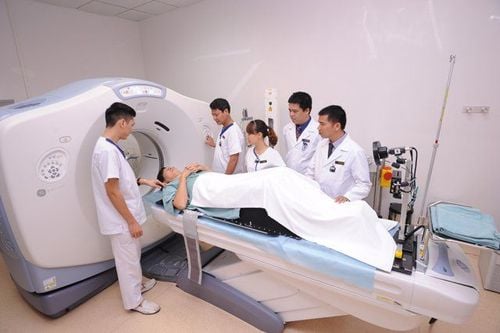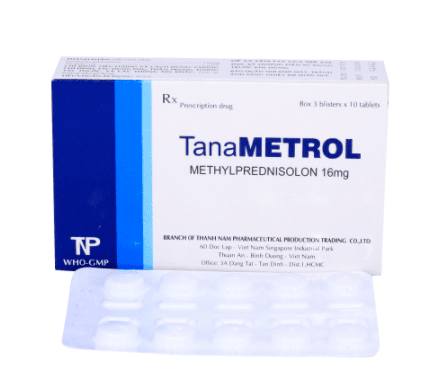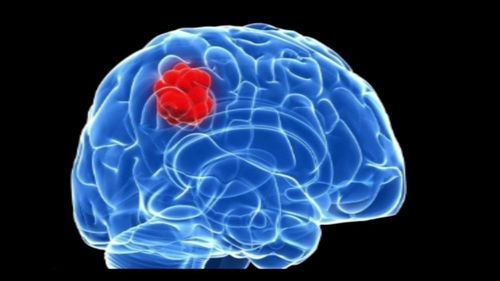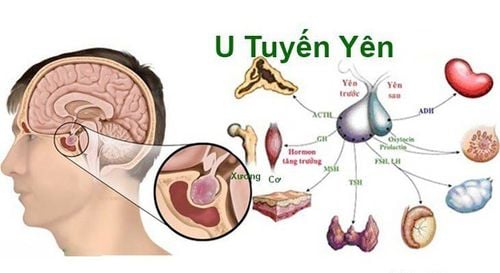This is an automatically translated article.
A pituitary tumor is an abnormal growth of a tumor in the pituitary gland. These tumors lead to the production of too much hormones that control the body's functions, there are also cases where the hormone is secreted too little, leading to not enough hormones needed for the body to function properly. The disease, if prolonged, will affect and endanger health, especially reproductive function in both men and women. Treatment of pituitary adenoma is the first thing to do as soon as the disease is detected.1. Detect pituitary tumor by any expression?
Most pituitary adenomas are benign tumors. However, if left untreated, the tumor still exists and grows and spreads to other organs of the body, causing complications and danger. Patients can immediately think of a pituitary tumor when they have the following symptoms:
Headache There are vision abnormalities In women, menstrual cycle changes In men, erectile dysfunction Infertility Abnormal lactation The body easily bruises Enlargement in the limbs or thickening of the skull and jawbone, due to hormone excess Fatigue of unknown cause Mood swings Irritability... When walking... On examination, the specific manifestations of pituitary tumor are:
Test results show an excess of hormones: + Growth hormone GH
+ Thyroid hormone TSH
+ Prolactin
+ Adrenal hormone Kidney ACHT
+ Gonadotropins Regulatory Hormones (FSH and LH)
If the tumor presses on the pituitary gland, the patient will be deficient in the following hormones: + Growth hormone GH
+ Thyroid hormone TSH
+ Prolactin
+ Adrenal Hormone ACHT
+ Gonadotropins Regulatory Hormone (FSH and LH)
If the tumor compresses the optic nerve or The motor nerve of the eye will show decreased vision, loss of vision, or double vision.
2. Examination and diagnosis of pituitary tumors
Before the right and timely treatment orientation, the patient will be examined by a doctor to diagnose a pituitary tumor. Through a thorough examination of the medical history, clinical examination, laboratory and laboratory tests, we can most accurately conclude how your tumor is.

Làm sao để phát hiện bản thân đang mắc bệnh u tuyến yên?
Specifically, blood and urine tests will be done to evaluate whether hormone indicators are excess or deficient. Imaging tests such as brain CT scan, brain magnetic resonance imaging can reveal the location and size of the pituitary tumor specifically.
Besides, the patient will also have a vision test to help determine if the pituitary tumor has affected vision, or peripheral vision. An endocrinologist will examine and conduct additional tests necessary to diagnose the condition of the pituitary gland tumor and provide the correct treatment that best suits the patient's condition.
3. Methods of treating pituitary tumors
There are now many treatment options for patients with pituitary tumors. Patients can remove the tumor, control tumor growth, control the amount of hormones in the body by taking drugs, or wait for treatment to be monitored and prescribed by a doctor when it is really necessary and effective. fruit.
To effectively treat pituitary tumors, the doctor's treatment indications for the patient will be based on the examination results, tumor type, tumor size, tumor growth in the brain, as well as age and health status of the patient. Current lung treatments such as surgery, radiation therapy, medication, or a combination of these treatments help the pituitary gland return to normal hormone production.
3.1 Surgery In cases where the pituitary tumor increases pressure on the optic nerve or increases the production of certain hormones, surgery will be indicated. The success rate of the surgery will depend on the tumor type, size and location, as well as whether the tumor has invaded or not. Currently, there are two surgical techniques to treat pituitary tumors that are applied: endoscopic tumor removal through the nasal cavity and surgery through transcranial approach.
Laparoscopic tumor removal through the sinuses allows the doctor to remove the tumor through the nose and sinuses without making additional cuts outside the skull. No other part of the brain is affected either, and there are no scars left. However, large tumors and tumors that have invaded nerves or brain tissues will be difficult to perform this method. Surgery through the transcranial approach: The tumor is removed through the upper part of the skull, through an incision in the scalp and skull. This technique will make it easier to reach large and complex tumors. 3.2 Radiation Therapy is a method of using high-energy X-rays to destroy tumors. This method can be used after surgery or if the patient's condition is not suitable for surgery. These are effective if the tumor has persisted for a long time and grows back after surgery, causing symptoms that do not respond to treatment.
Radiation therapy methods include targeted surgical radiation using Gamma Knife , which uses external radiation, using proton beams. With this treatment method, it usually does not give immediate results, but it takes time to see the full effect. Depending on the condition of the tumor of each person, radiation therapy can last for months or even a year.

Xạ trị sử dụng tia X năng lượng cao để tiêu diệt khối u trong tuyến yên
3.3 Use of medication Treatment Medications help people regulate hormone secretion and can sometimes reduce the size of some types of pituitary tumors. Patients may be prescribed drugs for prolactin-secreting tumors, growth hormone-secreting tumors, somatostatin, which can reduce growth hormone secretion and shrink tumors, pegvisomant will block the effects of excessive secretions. growth hormone...
3.4 Pituitary hormone replacement If a pituitary tumor or tumor surgery reduces hormone production, the patient should be treated with hormone replacement therapy to maintain hormone levels. normal in can. Hormone replacement therapy should be used for life and under the strict supervision of an endocrinologist.
The treatment process for pituitary adenoma should be regularly and closely monitored by the treating doctor with periodic tests to determine the effectiveness of treatment.
Thus, treating pituitary tumors helps maintain the patient's health. Early detection and treatment will make treatment much easier. Compliance with the treatment regimen plays an extremely important role, affecting the effectiveness of treatment for patients.
Vinmec International General Hospital is one of the hospitals that not only ensures professional quality with a team of leading medical doctors, modern equipment and technology, but also stands out for its examination and consultation services. comprehensive and professional medical consultation and treatment; civilized, polite, safe and sterile medical examination and treatment space.
In April & May 2021, when there is a need for examination and treatment of pituitary tumor at Vinmec Central Park International General Hospital, customers will enjoy double incentives:
- Free specialist examination
- 50% discount for customers with post-examination treatment indications. The program is limited to the corresponding technique of each hospital and to customers who perform this treatment technique for the first time at Vinmec.
Please dial HOTLINE for more information or register for an appointment HERE. Download MyVinmec app to make appointments faster and to manage your bookings easily.













